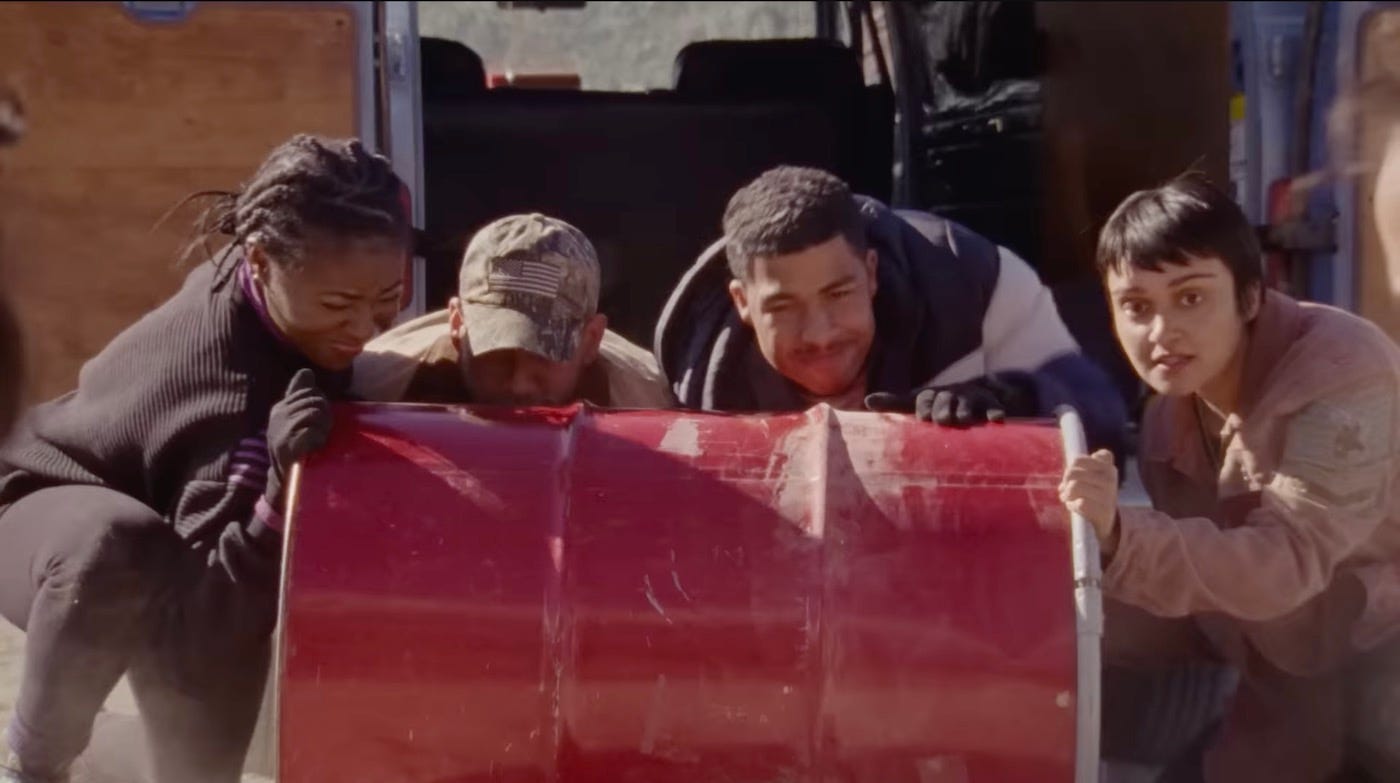First impressions of How to Blow Up a Pipeline
Is this spring's most suspenseful thriller too relevant to ignore? Or is it too preachy to succeed?
I recently showed a class full of undergraduates the Coen Brothers’ 1988 comedy Raising Arizona. You probably know the film, and perhaps you remember this moment:
Furniture salesman Nathan Arizona (Trey Wilson) has offered a cash reward for the rescue of his kidnapped infant son Nathan Junior, and an opportunistic bounty hunter has blown like a tumbleweed into his office. This massive, muscle-bound, tattooed motorcyclist is Leonard Smalls — a.k.a. “The Lone Biker of the Apocalypse.” And he’s not here to take the offer: He’s here to bargain.
Irked, Arizona replies that Smalls should take his deal or get out. But Smalls isn’t finished. He says he’s only asking for a “fair price” — one that “the market will bear.” He reveals that he is, himself, a survivor of a black market for babies, and then adds, “There are people — and, mind you, I know ’em — that’ll pay a lot more than $25,000 for a healthy baby. … I’ll get the boy regardless. And if you don’t pay, the market will.”
Smalls has come right out and said what so many other businesses conceal behind deceptive rhetoric: He would find a stolen baby and, instead of returning him to his grieving parents, he would sell the baby on the black market himself. And make a fortune. And why not, in a country that justifies so much harmful activity in the name of “the pursuit of [personal] happiness”?
Students, to their credit, were repulsed by this heartless, dollar-driven monster. Surely we can all agree that this is, as Nathan Arizona himself puts it, “an evil man.” He is showing us the dark side of capitalism, the consequences that can come from prioritizing profit above all else. “It’s just business,” some might say. But at what cost?
So here’s a question: If you think conscience demands that we stop human traffickers, how far are you willing to go to stop them? If weapons prove necessary for intervention and the rescue of vulnerable innocents from fortune-hungry opportunists, will you support that violence as justified?
Now, put yourself in the shoes of the young idealists who join forces in the film How to Blow Up a Pipeline.
The film, directed by Daniel Goldhaber, is based on a non-fiction book of the same title by climate change activist Andreas Malm. The book is a manifesto, really, praised by The Los Angeles Review of Books as “[o]ne of the most important things written about the climate crisis” and a “profoundly necessary book.” The film takes Malm’s propositions and imagines a narrative about what a real-world rebellion against heartless capitalism might look like.
The team of would-be Avengers who plot a rebellion in How to Blow Up a Pipeline don’t inspire much confidence. Young Xochi (Ariela Barer) might come closest to qualifying as the Brains of this outfit. She’s already posting mission statements on the windows of luxury cars and slashing their tires. She’s angry. When she buried her mother, who died in a heat wave, Xochi could look back over her shoulder and see evidence of the cause: plumes of smoke rising from a factory. But the Brawn is certainly Dwayne (Jake Weary), who is losing all patience with oil companies as they force their way onto his family property to chart the course of a pipeline.

But a plan like this has a lot of moving pieces, and so they need a lot of help. Xochi brings her college friends Shawn (Marcus Scriber) and Theo (Sasha Lane) on board. (If you'd told me that this takes place in the AHCU — the American Honey Cinematic Universe — and Sasha Lane is still playing the same character from that Andrea Arnold film, I might have believed you.) Shawn shares Xochi’s strong convictions, but for Theo it’s even more personal: she’s angry about the chemical causes of the cancer that is killing her. (In a world designed to favor big business over human decency, how’s a young woman like Theo to afford healthcare?) And then there’s Alisha (Jayme Lawson), who signs on reluctantly for Theo’s sake, mostly out of loving loyalty for her dying girlfriend.
Then there are Logan (Lukas Gage) and Rowan (Kristine Froseth) — lovers who look likely to miss their cues in carrying out the plan, probably because they’re too horny or too stoned. If you’re placing bets early on what’s likely to go wrong, you’ll probably pick on them.
But who can blame this anxious crew for doing their best to make a difference while the rest of the world amuses itself to death? They want a future — a future for themselves and for all who come after them. They believe that the future of Planet Earth has been taken hostage, that it’s being sold to the highest bidder. They see oil companies accelerating even though the oil business is destroying the planet’s climate and propelling Planet Earth headlong into a crisis that humankind cannot survive.
Just as you and I might decide that force is necessary to rescue stolen babies from armed human traffickers, so they have decided that it’s time to blow stuff up to try and save the planet those babies depend on.
They see clearly that it would be mad to do nothing. And, as my students saw it in Leonard Smalls, they see not merely ignorance at work but a sort of demonic villainy. Isn’t violence against a mad murderer an act of self defense? Isn’t their desire to strike at these companies, to hit them where it hurts, reasonable?
Keep reading with a 7-day free trial
Subscribe to Give Me Some Light to keep reading this post and get 7 days of free access to the full post archives.






